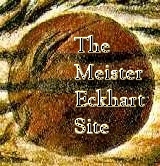|
|
||
 |
Meister Eckhart Home / Works by Meister Eckhart - Quotes / Inspired by Eckhart / Studies / The Papal Condemnation / Mail & Announcements / Links / Books |
ERNST TROELTSCH
From:
Ernst Troeltsch, The social teaching of the Christian
Churches, v. II,
tr. Olive Wyon, 1931, pp. 730 - 741. Here published without footnotes.
Page 11
The spiritualized conception of the Church in Protestantism, and the unsettlement which prevailed while the new Church organizations were being formed, provided this movement with scope for independent development. When this section was excluded from the churches and needed some other support and fellowship it found a very uncertain support and refuge in the excited "Enthusiasm" of the Anabaptists and in their ascetic system of morality. Some mystics remained entirely solitary, and entrusted their knowledge only to the printed page. Under these circumstances there arose a Protestant mysticism which, unlike Catholic mysticism, was not a compensation for ecclesiastical formalism, but which was a conscious, active, and independent principle of religious knowledge, inward experience, and morality. Only upon the basis of Protestant individualism and Paulinism did specifically Christian mysticism attain an independent development, with new creative power, which exercised an ever deeper influence upon ecclesiastical Protestantism, and yet always remained inwardly separate from it. Anticipating the results of the modern, speculative, and autonomous philosophy of religion, it pointed forward to the development of modern Protestantism, and, in connection with Pietism, it destroyed ecclesiasticism, making the ecclesiastical exclusiveness and institutionalism of Protestantism increasingly uncertain.